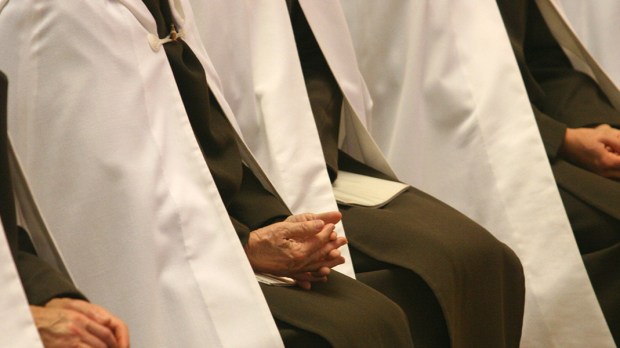Scattered throughout the world are numerous contemplative monasteries, where men and women dedicate their entire lives to prayer. Most of us never see them, or even know of their existence.
Sometimes there are even contemplative hermits who live nearby, but who never interact with the local community.
At the surface level it may seem like they do not contribute anything to society, as they don’t engage in visible works of charity. However, they do a wealth of good, though it is an invisible good that benefits our eternal soul.
Pope Benedict XVI reflected on this reality in an Angelus message in 2006 on the feast of the Presentation of Mary in the Temple. He first recognizes that same question people have about their “value” to society.
Some may wonder what meaning and value their presence could have in our time, when there are so many situations of poverty and neediness with which to cope.Why “enclose oneself” for ever between the walls of a monastery and thereby deprive others of the contribution of one’s own skills and experience? How effective can the prayer of these cloistered Religious be for the solution of all the practical problems that continue to afflict humanity?
These are honest questions, but they come from a view of the world that is primarily material, forgetting the spiritual reality that is invisible to the eyes. Contemplative men and women remind us that there is something more important in this world.
[T]hese brothers and sisters of ours bear a silent witness to the fact that in the midst of the sometimes frenetic pace of daily events, the one support that never topples is God, the indestructible rock of faithfulness and love. “Everything passes, God never changes,” the great spiritual master Teresa of Avila wrote in one of her famous texts.And in the face of the widespread need to get away from the daily routine of sprawling urban areas in search of places conducive to silence and meditation, monasteries of contemplative life offer themselves as “oases” in which human beings, pilgrims on earth, can draw more easily from the wellsprings of the Spirit and quench their thirst along the way.
Furthermore, these monasteries act as invisible “lungs,” holding up the world with their spiritual prayers.
Thus, these apparently useless places are on the contrary indispensable, like the green “lungs” of a city: they do everyone good, even those who do not visit them and may not even know of their existence.
To conclude, St. John Paul II affirms the value of contemplative life in his apostolic exhortation Vita Consecrata, seeing in it a sign that points us back to God.
Monasticism and the contemplative life are a constant reminder that the primacy of God gives full meaning and joy to human lives, because men and women are made for God, and their hearts are restless until they rest in him.

Read more:
Contemplative monasteries and convents join “prayer storm” during coronavirus pandemic

